Doctors reveal tragic new detail about young people with colon cancer
Young people are being diagnosed with bowel cancer in record numbers – and now researchers are warning that the cancer is more likely to be diagnosed at a later stage and to return.
The number of colon cancer diagnoses has skyrocketed in the US over the past two decades, with healthy people in their 20s and 30s increasingly developing the disease.
And experts are rushing to find the cause, blaming obesity, processed foods and a sedentary lifestyle.
But amid a flood of theories, researchers in Denmark have revealed the tragic common themes found in young patients.
In a study of 25,000 adults with colorectal cancer (CRC), researchers found that early-stage disease was associated with a later-stage diagnosis and that people under 50 were nearly 30 percent more likely to develop cancer than older patients .
It also took less time for the cancer to return, suggesting that younger patients have more aggressive forms of the disease.
However, the team said more research is needed to determine whether younger patients should be screened more intensively for relapse.
The above graph shows the increase in colorectal cancer cases in the US in men and women between 2000 and 2021.
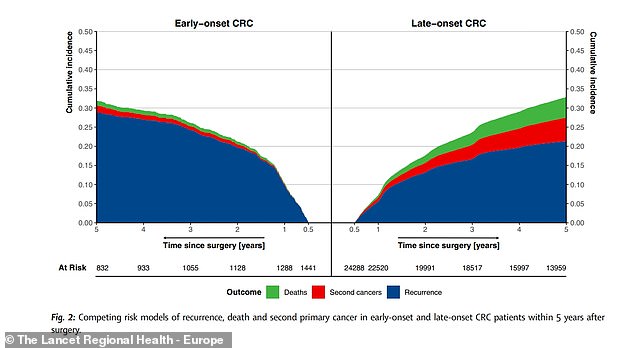
The above graphs show how faster younger people with colon cancer (left graph) develop recurrences and other tumors than people with later-onset colon cancer (right graph)
The study, published in December in the journal The Lancet Regional Health – Europe25,729 patients with colorectal cancer were looked at, five percent of whom were younger than 50 years old.
Participants were 31 to 80 years old and diagnosed at stages one, two or three.
The average age of participants was 68 years and 56 percent of patients were male.
Most patients (40 percent) had stage two cancer, while 36 percent were stage three and 23 percent were stage one.
The participants were divided into three groups based on when they had surgery to remove their tumors: 2004-2008, 2009-2013 and 2014-2019.
The researchers followed them for six months after surgery until they relapsed, died from the disease, were diagnosed with another form of cancer, moved to another country or had no recurrence for five years.
Patients under age 50 had a recurrence rate of 29 percent over five years, compared with 21 percent for the older group – a 28 percent increased risk that their disease would come back.
In addition, younger participants had recurrence after an average of 14.5 months, compared to 17.5 months for older patients.
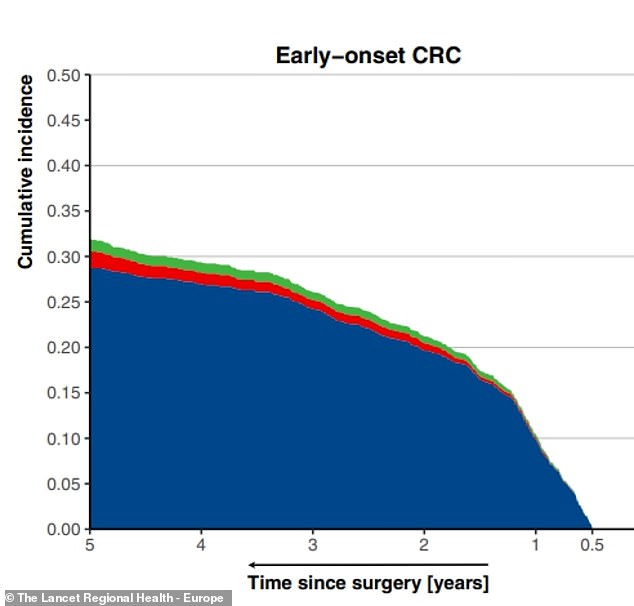
The graph above shows the rate at which younger people with bowel cancer develop recurrences (blue), other cancers (red) and death (green)
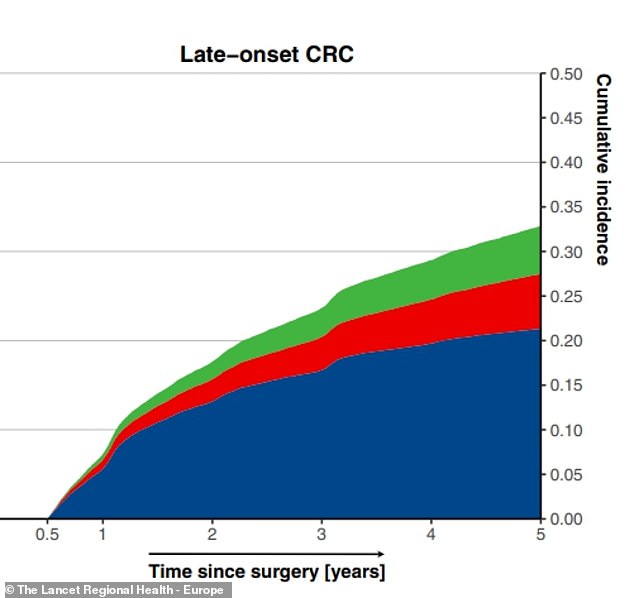
The graph above shows the rate at which older people with colon cancer experience recurrences (blue), other cancers (red) and deaths (green)
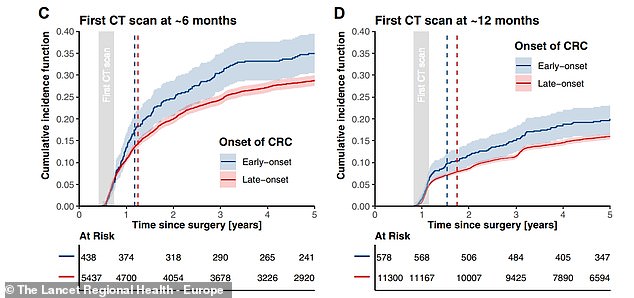
The above graphs show the increased risk of recurrence in younger patients six (left) and 12 months (right) after surgery
Patients under the age of 40 had the highest relapse rate, at 31 percent over a five-year period. The relapse rate for people 40 to 49 years old was 28 percent, and in patients 50 to 59 years old, the recurrence rate was 23 percent.
The experts suggested this could be because patients under 40 are considered too young to qualify for regular bowel cancer screening – such as a colonoscopy – so they only receive a diagnosis when their cancer becomes serious enough to cause symptoms and spread. spread through their bodies.
However, other recent research suggests that diets high in ultra-processed foods, which have become increasingly common in recent decades, could be the cause.
Studies estimate that 70 percent of American diets now consist of processed foods and ingredients.
Researchers of the 2024 study also found that younger patients with cancer were more likely to have follow-up scans after their diagnosis, which could have led to tumors being caught earlier.
However, younger patients were more likely to survive their diagnosis than older patients.
Of those in the early-onset relapse group, 39 percent died within five years, compared with 55 percent of relapse patients over age 50.
This may be due to the fact that younger patients are less likely to have other pre-existing conditions, such as obesity and high blood pressure.

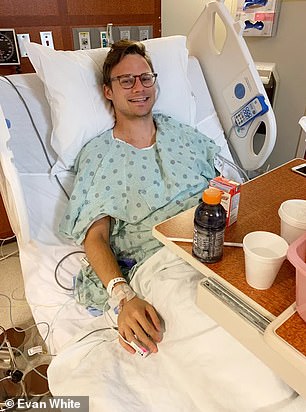
Raquel (left) was 28 when doctors diagnosed her with stage four colon cancer. Evan White (right) was diagnosed with colon cancer at the age of 24. He died four years later, just weeks before his wedding
The authors acknowledged several limitations of the study, such as excluding patients older than 80 years and patients with previous cancers.
Patients who had a recurrence within six months of surgery were also not included because the researchers wanted to wait until patients stopped their primary treatments.
The researchers said: ‘Our study suggests that patients with early-onset CRC had a higher risk of recurrence compared with late-onset CRC from 2004 to 2019 across all disease stages, indicating that delayed diagnosis is not the only explanation for the higher risk .
‘Nevertheless, increased awareness of the early occurrence of colorectal breast cancer in general practice and among gastroenterologists can still promote earlier diagnosis and prognosis in these patients.’
The US has the sixth highest rate of premature cancer, with 87 cases per 100,000 people under age 50, and colon cancer is among the fastest rising.
Researchers from the University of Missouri-Kansas City recently looked at the number of colorectal cancer cases in people ages 10 to 44 over the past two decades. increased in all age groups.
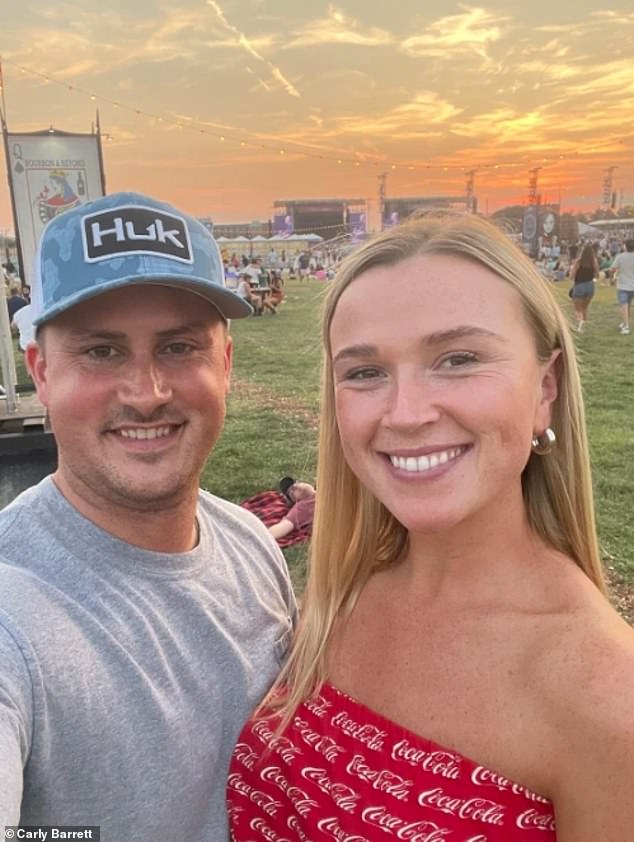
Carly Barrett, from Kentucky, was diagnosed with colon cancer at the age of 24 after discovering blood in her stool and experiencing abdominal pain
The number of colorectal cancers grew by 500 percent among children aged 10 to 14 and by 333 percent among teenagers aged 15 to 19.
Rates rose 71 percent among people aged 30 to 34 to seven cases per 100,000 people. Among people aged 35 to 39, the figures rose by 58 percent to 12 cases per 100,000 people.
In many young patients, symptoms are dismissed due to benign gastrointestinal disease, leading to more aggressive disease.
DailyMail.com has repeatedly documented the global rise of colon cancer among young people.
For example, Raquel from California was diagnosed with stage four colon cancer at the age of 28.
She had been suffering from severe diarrhea on and off for three years, with blood in her stool. Still, doctors referred her to a psychologist instead of ordering additional tests.
And Evan White, 24, of Dallas, had just graduated from the University of Arkansas with a degree in finance when he was diagnosed with colon cancer after ignoring his main symptom — fatigue — for months.
The tumor was not noticed until it had reached stage three, meaning it had spread beyond the colon, making it much more difficult to treat.
He died at the age of 29, just before his wedding.
